| | | | | | | Presented By Raytheon Technologies | | | | Axios World | | By Dave Lawler ·Dec 17, 2020 | | Welcome back to Axios World. - We're starting tonight in Turkey and making stops in Japan, Burkina Faso, Malta and more (1,754 words, 6½ minutes).
- Give a friend the gift of Axios World this holiday season. Or just tell them to sign up for free.
Situational awareness: "The Energy Department and National Nuclear Security Administration, which maintains the U.S. nuclear weapons stockpile, have evidence that hackers accessed their networks as part of an extensive espionage operation that has affected at least half a dozen federal agencies," Politico reports. The DOE says the hackers didn't access critical systems. | | | | | | 1 big thing: What to expect from Biden and Erdoğan | 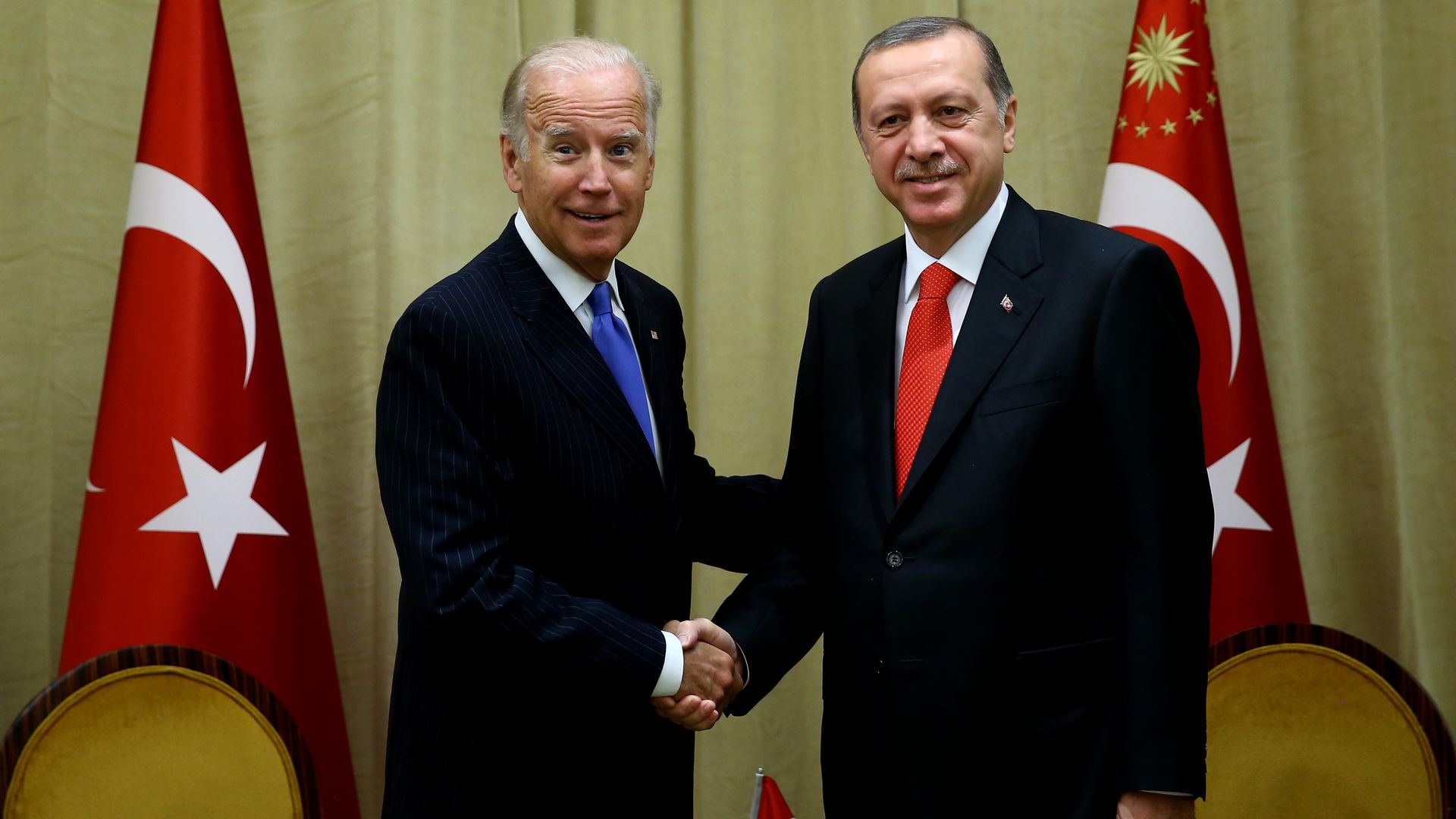 | | | All smiles. Biden and Erdoğan in 2016. Photo: Kayhan Ozer/Anadolu Agency/Getty | | | | President Trump's imposition of long-awaited sanctions on Turkey this week over its purchase of a Russian S-400 missile defense system illustrates the fragile state of a critical relationship — but it may also clear the decks for President-elect Joe Biden. Why it matters: Erdoğan raged against the sanctions, which target Turkey's defense procurement agency and the agency's leaders, as a "hostile attack" from a NATO ally. Trump had resisted pressure to impose them, but Congress forced his hand. The big picture: While Erdoğan maintained a strong personal relationship with Trump over the last four years, many others in Washington were growing increasingly concerned by his muscular regional policies and warming ties with Russia. - Enter Biden. His promises to revitalize multilateralism and prioritize relations with countries who "share our democratic values" — not to mention his skewering of Trump for embracing "all the thugs in the world" — pose very different challenges for Erdoğan.
- The two also have history. As vice president in 2014, Biden called Erdoğan an "autocrat" and said he would support the opposition's efforts to defeat him. (Biden later issued an official apology).
What to watch: Soner Cagaptay, a fellow at the Washington Institute and author of "Erdoğan's Empire," expects Erdoğan to open with a charm offensive. - The Turkish president is a "shapeshifter" who "becomes what every U.S. president wants to see in their Turkish counterpart" — in Biden's case, an "internationalist, reformer, healer."
- "He wants to reverse this narrative of free-falling ties," Cagaptay says, because it's damaging for Turkey's struggling economy and leads others to question whether the U.S. military really stands behind Turkey.
Biden has incentives of his own to patch things up. Turkey could play the role of either facilitator or spoiler in two of Biden's top foreign policy focuses: Iran and Russia. - And while Biden will include human rights and democracy in the relationship, Cagaptay says, Erdoğan will attempt to placate him, perhaps by releasing some political prisoners.
Yes, but: This will be a deeply complicated relationship, and it could quickly turn contentious. - Russia, which has massive geopolitical and economic leverage over Turkey, wants to expand the U.S.-Turkey divide, and it could pressure Ankara to switch the S-400 system on. That would provoke both the U.S. and NATO, which views the Russian system as a threat.
- Erdoğan would likely choose a fight with Biden over one with Putin, Cagaptay says. He's already involved in squabbles with the EU over immigration and gas exploration that could also pull in the Biden administration.
- Further crackdowns by Erdoğan on the political opposition would also generate backlash.
The bottom line: "Erdoğan's relations with U.S. presidents start well," Cagaptay says. "They never end well." |     | | | | | | 2. Leaders and the virus: Suga low | 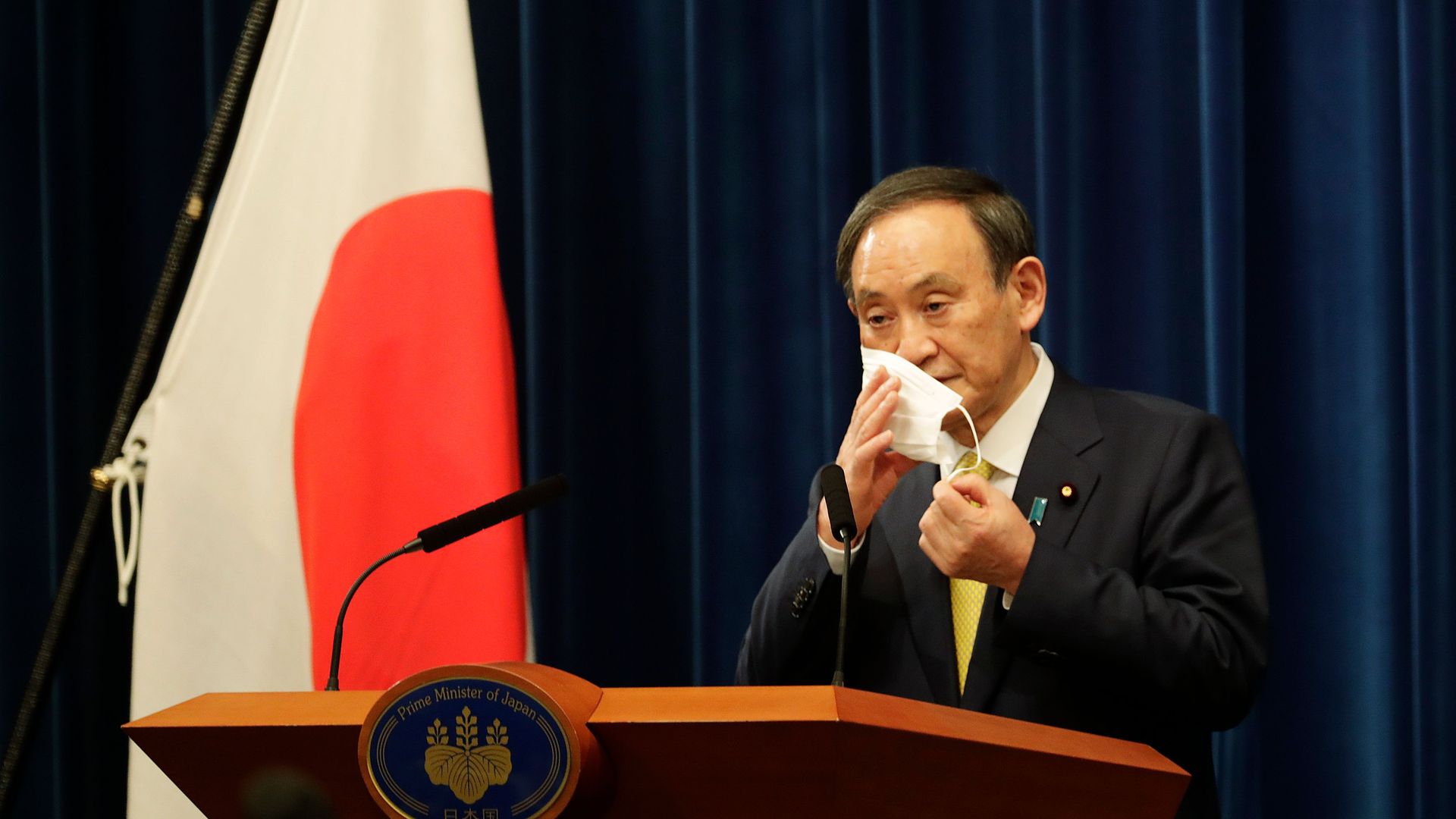 | | | Suga at a press conference. Photo: Hiro Komae/Pool/AFP/Getty | | | | 1. Japanese Prime Minister Yoshihide Suga's approval ratings have fallen off a cliff since he replaced Shinzo Abe three months ago, per Morning Consult's tracker. - By the numbers: One month ago, Suga's approval rating was 51% and his disapproval rating 31%. Now those numbers have nearly flipped (36% approve/50% disapprove). The decline comes as Japan's COVID-19 outlook deteriorates.
- It won't be helped by the news that Suga attended an upscale dinner with other prominent guests on Monday, breaching advice from his own government to limit social gatherings to four people.
- What to watch: Abe's eight-year tenure was an outlier. Before 2012, Japan had shuffled through seven prime ministers in six years.
2. French Prime Minister Emmanuel Macron tested positive for the coronavirus today after experiencing symptoms, and he's working from isolation (he attended a videoconference today on foreign aid). - European Council President Charles Michel and Spanish Prime Minister Pedro Sánchez both recently met with Macron and have now entered quarantine, as have Macron's prime minister and other French officials.
3. Russian President Vladimir Putin said during an annual marathon press conference today that he will be vaccinated, but only when his age group becomes eligible. Putin, 68, said that was because he's a "law-abiding person." - He also denied that Russia's security services were involved in the poisoning of opposition leader Alexei Navalny, despite evidence to the contrary.
- "The intelligence agencies of course need to keep an eye on him. But that does not mean that he needs to be poisoned — who needs him? If they had really wanted to, they would have probably finished the job," he said.
|     | | | | | | 3. Global news roundup | 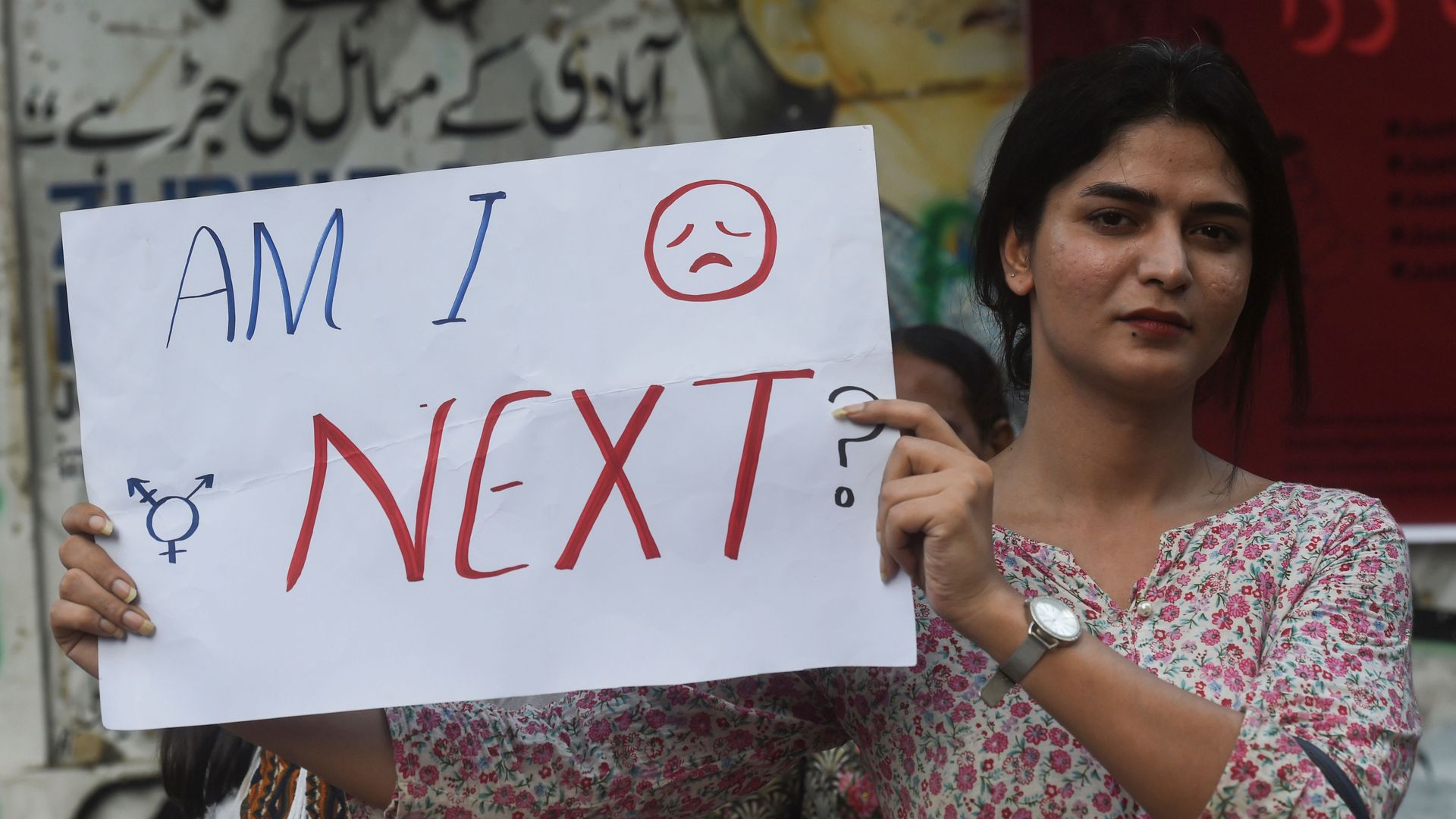 | | | A protester in Karachi, Pakistan, following an alleged gang rape. Photo: Asif Hassan/AFP via Getty | | | | 1. Putin, Mexican President Andrés Manuel López Obrador and Brazilian President Jair Bolsonaro all recognized Biden's victory this week. Why it matters: They had been the only major world leaders still publicly giving credence to Trump's legal challenges. - Bolsonaro's defection is notable. He embraced Trump more enthusiastically than perhaps any other world leader, and he previously echoed Trump's claims that the election was rigged.
- North Korea's Kim Jong-un hasn't made a statement on the election result either way. Nearly every other leader has congratulated Biden.
2. Pakistan's government has announced harsher punishments for men convicted of rape, including possible chemical castration, following months of protests over allegations of official indifference to sexual assault. - The big picture: Rape is treated as a taboo subject in Pakistan, and victims are often pressured to drop their allegations, per the NYT. The protests were sparked by high-profile cases earlier this year.
- What to watch: Prime Minister Imran Khan is under pressure amid separate protests, organized by the opposition Pakistan Democratic Alliance, which accuses him of mismanagement and serving as a "puppet" for the military.
- "Opposition leaders announced Sunday they would march to the capital, Islamabad, with their supporters in January 2021 in a final attempt to overthrow Khan," per DW.
3. More than 300 Nigerian schoolboys were reportedly released to government security agencies today after being kidnapped from their school one week ago. - Boko Haram claimed responsibility for the abductions.
- It remains unclear if all of the boys who were taken are safe, but there has been an outpouring of relief in Nigeria after fears the teenage boys would be kept as long-term hostages, per WSJ.
|     | | | | | | A message from Raytheon Technologies | | The future of aerospace and defense is here | | |  | | | | At Raytheon Technologies, nearly 200,000 engineers, scientists and researchers are pushing the limits of known science to explore deep space, advance aviation and build smarter defense systems that protect all of us here at home. That's the future of aerospace and defense. Learn more at RTX.com | | | | | | 4. Reasons to worry in 2021 |  | | | A school in Kaya, Burkina Faso, where many of the students are recently displaced. Photo: Olympia De Maismont/AFP via Getty. | | | | Yemen topped the International Rescue Committee's annual watchlist of the world's most dire humanitarian crises for the third consecutive year, followed by Afghanistan and Syria. The big picture: All three face chronic violence and instability, and Yemen is one of four countries at risk of famine in the coming year (the others are Burkina Faso, South Sudan and northeastern Nigeria). - Top 10: Yemen, Afghanistan, Syria, Democratic Republic of Congo, Ethiopia, Burkina Faso, South Sudan, Nigeria, Venezuela, Mozambique.
- Watchlist countries: Cameroon, Central African Republic, Chad, Colombia, Lebanon, Mali, Niger, Palestine, Somalia, Sudan.
The good news: In a briefing with reporters, IRC CEO David Miliband noted that the "sting of direct COVID impact" on those 20 countries has been less severe than feared. - But the indirect impacts on public health campaigns like vaccinations, treatments for illnesses like malaria, and malnutrition rates had been severe due to the virus and its economic impacts, including on supply chains.
Zoom in: Burkina Faso is a newcomer to the IRC's top 10 list. - "Just two years ago, Burkina Faso faced virtually no mass conflict or displacement," per the IRC report. But the number of displaced people there has doubled this year to over 1 million.
"For a long time, Burkina Faso was spared from the neighboring conflicts," says the IRC's director in the country, Alain Cavenaile, referring to violence in other Sahelian countries, like Mali. - Former President Blaise Compaoré had essentially formed a truce with local armed groups, but it broke down after he was ousted in 2014.
- Mass displacement began in 2018 and accelerated over the past year, Cavenaile says. Small bands of armed fighters will often arrive in a community, kill a local leader and force everyone else to flee with nothing but the clothes on their backs.
- With few refugee camps or other facilities available, the displaced people — mostly women and children — are hosted in other communities, straining resources there.
What to watch: Roch Kabore was re-elected as Burkina Faso's president on Nov. 26. He has refused to negotiate with the fighters and attempted to establish "security bubbles" around major cities. |     | | | | | | 5. What they're saying: Obama on how Biden should lead | 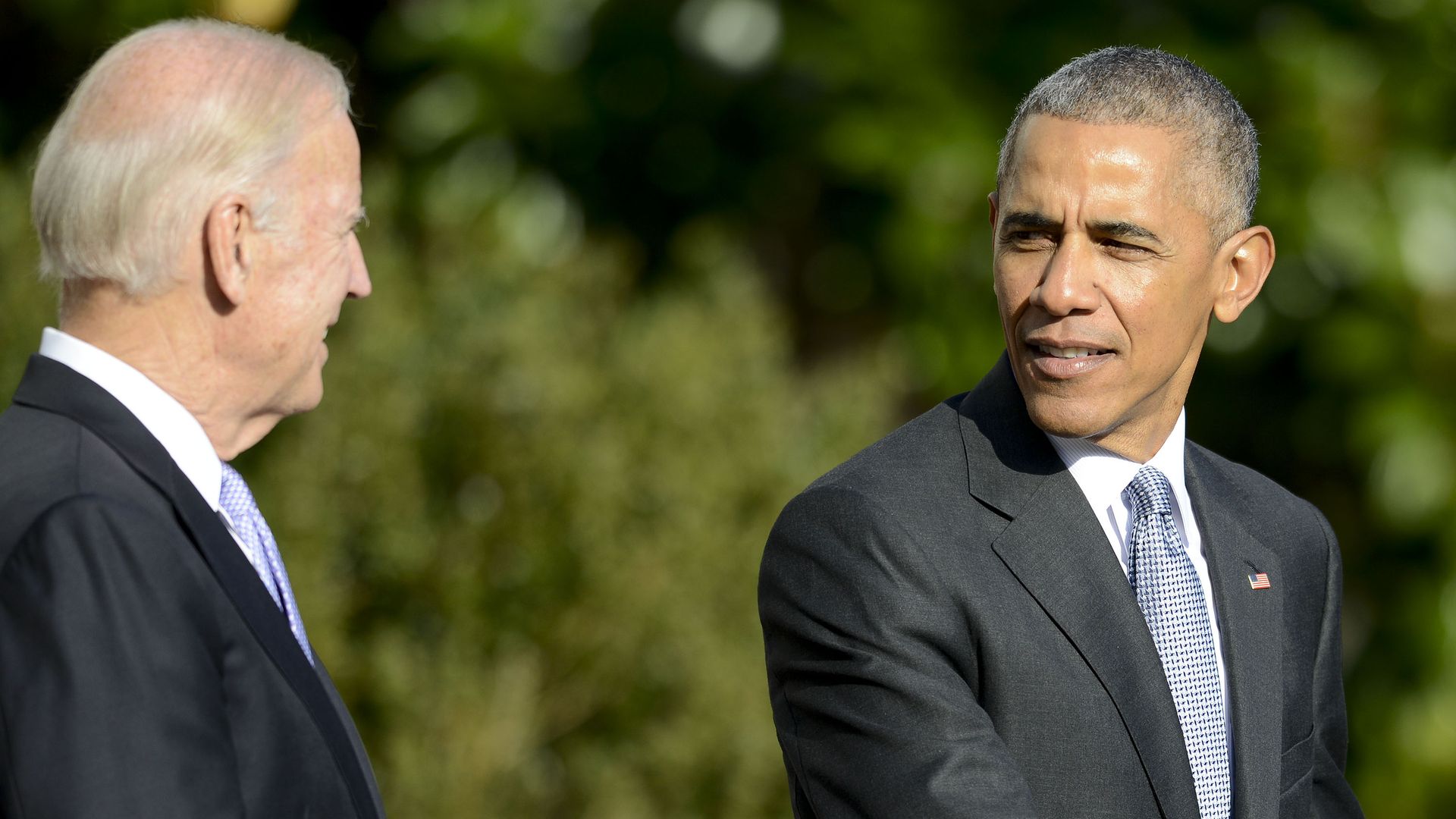 | | | Photo: Leigh Vogel/WireImage | | | | The coming year will be marked by a number of firsts for Joe Biden as president on the international stage: summits, initiatives, potential agreements. Barack Obama offered his assessment of America's ability to shape outcomes in such settings this week on the "Pod Save the World" podcast. "At least during my presidency what was still true — and I think this is what was lost during the Trump presidency and I think will be a necessary challenge for the Biden/Harris administration to confront — we still set the agenda in these meetings." - "And if we didn't set the agenda, nobody else had the combination of technical skill, bandwidth, diplomatic experience, relationships, trust and power to be able to stitch together various interests to arrive at something like a Paris accord."
Obama referred specifically to the 2009 Copenhagen climate summit, which was largely viewed as a failure but did produce a framework that Paris built upon. - Only the U.S. could have persuaded the Europeans to accept a deal that fell well short of their hopes and convince the Chinese they'd pay a price if they didn't sign on.
His bottom line: In a multipolar world, the U.S. can't walk into a room and demand everyone fall into line. Instead, it has to understand the interests of the key players, lead by example, and play the roles of "convener, agenda-setter, persuader." - Without that U.S. leadership, he argues, meaningful international cooperation on big issues like nuclear proliferation or global health simply won't happen.
- "It's not like China filled that void or wants to fill that void," Obama said.
|     | | | | | | 6. What I'm reading: A murder in Malta |  | | | Protesters hold photos of Daphne Caruana Galizia last December in Valletta. Photo: Andreas Solaro/AFP via Getty | | | | Daphne Caruana Galizia was no stranger to intimidation, as Ben Taub reports in the New Yorker. - As she made a name for herself as an investigative reporter, columnist and blogger — producing the sort of hard-hitting and irreverent articles that were simply not written in conservative and insular Malta, particularly by a woman — her dog was killed and her front door was set on fire.
- She was a vocal part of the campaign to join the European Union, a cause which brought her into conflict with a young politico who lived right across an olive grove from her: Joseph Muscat, the future prime minister.
The island's ascension into the EU in 2004 helped fill the pockets of the well-connected, who sold passports and helped launder money into the bloc. - The sums at stake grew, and so did Daphne's profile. She leveled allegations of corruption against members of Muscat's inner circle, and they vilified her so thoroughly that she couldn't leave home without facing jeers and intimidation.
On Oct. 16, 2017, she was killed in a car bomb. - With every reason to distrust the state, her three sons essentially set up a parallel investigation with help from the EU and journalists from around the world.
- When they refused to hand over Daphne's unfinished reporting to police, Muscat's allies alleged that they had something to hide.
- But the public pressure swung against Muscat, who resigned amid protests in January 2020. Other powerful players have been arrested in connection with the murder.
Dive in |     | | | | | | 7. Stories we're watching | 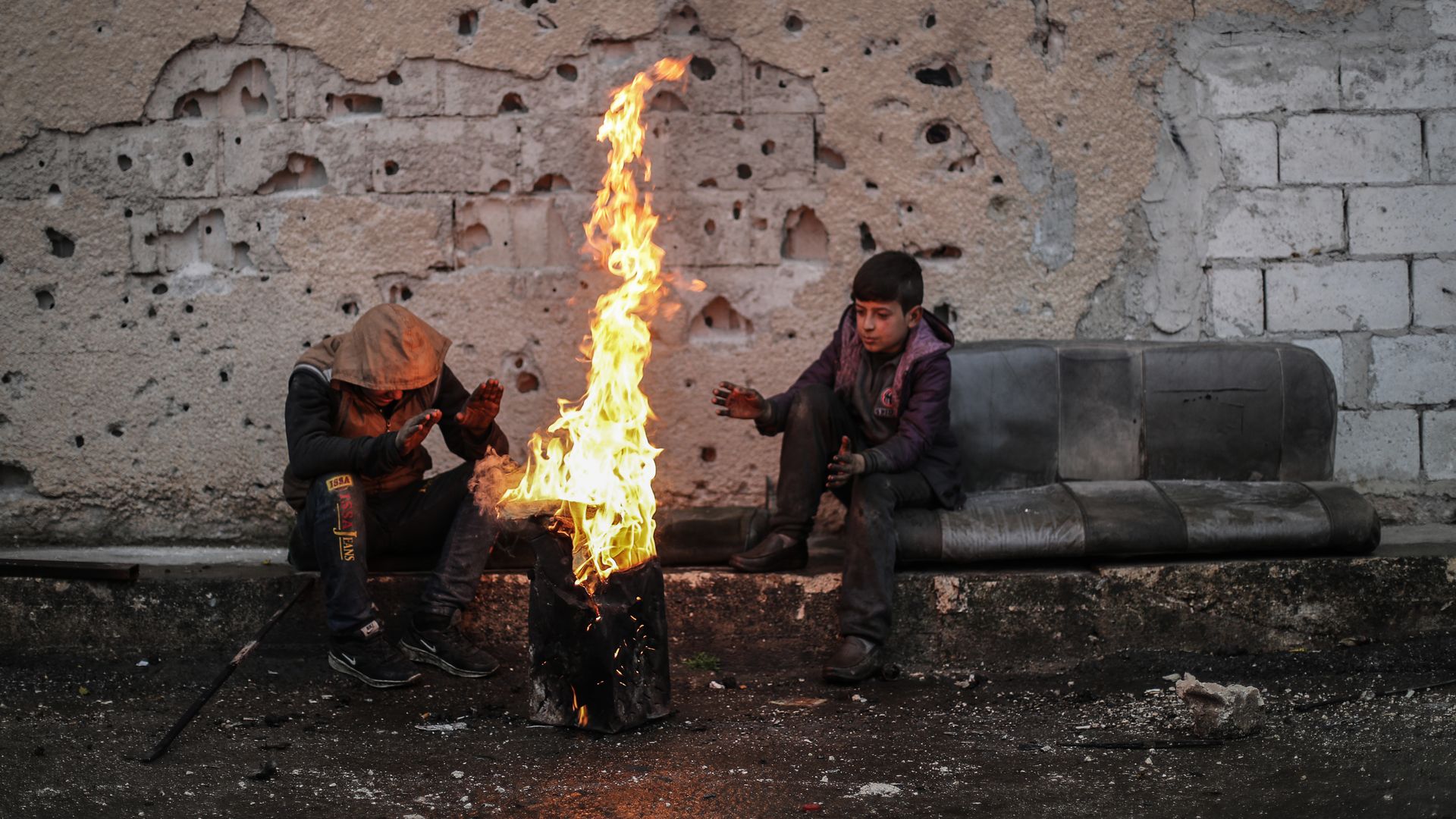 | | | Staying warm in Idlib, Syria. Photo: Anas Alkharboutli/picture alliance via Getty | | | - Top U.S. general Milley meets with Taliban
- Russia's big hack: What we know
- Hong Kong's worst-case scenario is happening
- China brings moon rocks back to Earth
- U.S. accuses Switzerland and Vietnam of currency war
- ICC won't investigate China genocide claims, for now
- Russia banned from using name and flag at next 2 Olympics
Quoted: "I think we have failed." — Sweden's King Carl XVI Gustaf on his country's response to the coronavirus |     | | | | | | A message from Raytheon Technologies | | The future of aerospace and defense is here | | |  | | | | At Raytheon Technologies, nearly 200,000 engineers, scientists and researchers are pushing the limits of known science to explore deep space, advance aviation and build smarter defense systems that protect all of us here at home. That's the future of aerospace and defense. Learn more at RTX.com | | | | | | Axios thanks our partners for supporting our newsletters.
Sponsorship has no influence on editorial content. Axios, 3100 Clarendon Blvd, Suite 1300, Arlington VA 22201 | | | You received this email because you signed up for newsletters from Axios.
Change your preferences or unsubscribe here. | | | Was this email forwarded to you?
Sign up now to get Axios in your inbox. | | | | Follow Axios on social media:    | | | | | |










No comments:
Post a Comment